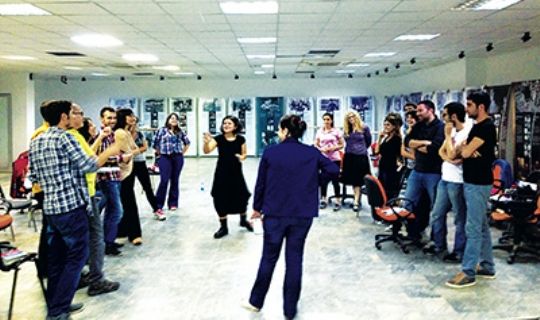Gonca Sahin has devoted herself to actively fight against discrimination and hate crimes, in Turkey. As part of the Anne Frank- A History for Today project run by The Association for Social Change in cooperation with Anne Frank House, she coordinates two- day Holocaust education seminars, in Turkey. The seminars took place in Ankara, Izmir and recently in Diyarbakir. We talked with Ms.Sahin about the importance of Holocaust education in Turkey and the recent two- day seminar, in Diyarbakir.
October 21, 2014
How did you first learn about Holocaust?
I’ve studied Social Sciences. The history of Holocaust was part of the curriculum at the universities I studied in. However, I can’t exactly say that most of the universities put adequate emphasis on Holocaust. Holocaust is only briefly studied as a ‘fact’ within the framework of World War II’s political history. The human rights aspect of the issue along with anti-Semitism as a racist ideology in today’s world and Turkey and its consequences are totally left out. I’ve first learned about systematic Holocaust education from Anne Frank House.
How did you get involved in this project?
As Association for Social Change we’ve been organizing awareness activities about hate crimes and human rights, since 2009. As a result of our meetings with Anne Frank House, we’ve realized that Holocaust education is an important necessity in Turkey. Anti-Semitism is a very strong fact, in Turkey. We believe that Holocaust education is the antidote for anti-Semitism and thus Holocaust education should be included within Turkey’s curriculum. It’s important for non-governmental organizations to take action and pave the way for public institutions.
For the first time in Turkey on September 27-28, “Holocaust, Prejudice and Discrimination” seminar was held in Diyarbakir for educators to raise awareness about discrimination and Holocaust. How was the turnout?
We’ve received a lot of applications just like we did for our seminars in Ankara and Izmir. Nearly 100 people applied for the seminar in Diyarbakir. The applicants had very different backgrounds. Aside from teachers and teacher candidates, applicants included university students from different departments, people who worked at NGOs and legal practitioners. Aside from Diyarbakir, considerable number of applicants was from nearby cities.
How was the reaction, the feedback?
At the end of the seminar, we held an evaluation session where we’ve received very positive feedback from participants. We’ve seen that there’s a serious demand for this type of educational seminar to be organized more frequently and in other cities. We observed that after the two-day seminar, there has been a significant change in how participants view Holocaust.
How familiar are Turkish people with Holocaust?
Unfortunately, Holocaust is not a part of the curriculum in Turkey. Even in Universities’ relevant faculties, the issue is not covered adequately. The application forms and the interviews we held with participants demonstrated that people learn about Holocaust from movies and documentaries, in other words through popular culture.








